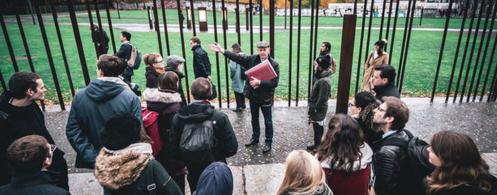
Par Ana Vasconcelos Martins et Sophie L. Vériter Assistantes de recherche, Histoires d'Europe, Programme Dahrendorf, Centre d'études européennes, Université d'Oxford
Les récits, aussi insaisissables soient-ils, sont des forces puissantes de l'histoire qui façonnent les événements autant que les événements les façonnent. À l'heure où l'Europe est confrontée à de nombreux défis - économiques, sociaux, environnementaux, politiques, voire existentiels et fondamentaux - les histoires que l'Europe raconte aujourd'hui détermineront ce qu'elle deviendra dans dix ans, et au-delà. D'où l'importance de comprendre les principaux récits qui préparent l'avenir de l'Europe.
À l'occasion de sa conférence du 10e anniversaire en mai 2019, le programme Dahrendorf pour l'étude de la liberté a officiellement lancé le projet Histoires d'Europe, qui est financé par la fondation Mercator, la fondation ZEIT et la fondation Friedrich Naumann. Ce projet a pour but de recueillir les histoires que l'Europe raconte et devrait raconter, ainsi que les attentes des Européens à l'égard de l'UE pour l'avenir.
Comme l'a fait remarquer à l'époque le professeur Timothy Garton Ash, directeur d'Europe's Stories, il y a potentiellement autant d'histoires européennes qu'il y a d'Européens. Pourtant, quel que soit le nombre de moments uniques qui façonnent le récit de chaque individu, il existe des moments passés, des préoccupations actuelles et des espoirs pour l'avenir de l'Europe qui sont transversaux aux expériences des Européens de l'ensemble du continent.
Research & events
Our team of more than 20 researchers from across Europe has set out to pin down the defining moments and aims that constitute Europe’s stories by combining the following research methods:
- Qualitative interviews with, and self-interviews by, people from different generations, places and social backgrounds, as well as experts from various subject areas;
- Opinion polling on EU policy preferences in partnership with the eupinions project of the Bertelsmann Foundation;
- Secondary research: data gathered from other normative, descriptive and analytical projects as well as interactive initiatives such as websites, podcasts and movements relating to the Europe’s Stories’ topic areas.
Since the 10th Anniversary Dahrendorf Conference, during which the project’s research focus was debated among specialists from fields as different as Politics and Theatre, our team has also organised a conference with ‘post-89ers’ (those born roughly between 1980 and 2000) in partnership with the Mercator Foundation in Berlin, where we carried out deliberative polling on Europe’s Stories core questions. We also conducted two workshops with high school students in Germany, where generational attitudes regarding the future of Europe were discussed. These events provided insights and feedback that proved crucial to the design of our ongoing research.
Key preliminary findings
Our interviewees answer a set of six questions about the moments they consider most significant in their experience of Europe. Based on the first 117 of these ongoing interviews, all of which can be viewed on the Europe’s Stories website, personal experiences such as studying and travelling abroad tend to be more formative than particular historic events. Correspondingly, freedom of movement leads as the single most important thing that the majority of interviewees say Europe has done for them personally. Most interviewees, in the UK and in other European countries, consider Brexit the worst moment in recent European history. Many, especially Eastern Europeans, name the Eastern Enlargement of 2004 as their best European moment.
Addressing climate change is the most popular answer to the interviews’ final question about the one thing our respondents would like the EU to have achieved by 2030. This finding partly informed the questions we put to Europeans in our first specially commissioned opinion poll about EU policy preferences. Aside from climate change policy, we also asked people’s opinions on jobs and social security. From that survey of more than 12,000 respondents between the ages of 16 and 69 in all 27 EU member states and the UK, two of our most remarkable findings reported were: (a) ‘71% of Europeans are in favour of a universal basic income (UBI)’; and (b) ‘53% of young Europeans think authoritarian regimes are better equipped to address the climate crisis’. This poll was conducted by our partner eupinions between 5 and 25 March 2020, thus likely reflecting the impact of the pandemic on our respondents’ concerns.
